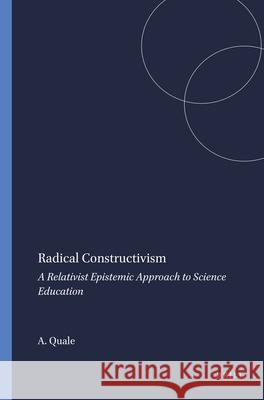Radical Constructivism : A Relativist Epistemic Approach to Science Education » książka
Radical Constructivism : A Relativist Epistemic Approach to Science Education
ISBN-13: 9789087906108 / Angielski / Miękka / 2008 / 244 str.
This book addresses the topic of science education, from the viewpoint of the theory of radical constructivism. It takes a closer look at the "image of science" that is projected, in the presentation of it to students and to the general public. This leads into a broad discussion of the notions of learning and knowing, specifically referring to issues of epistemology (the nature of scientific knowledge) and ontology (what science can tell us about the world), and the implications of these issues for science education. In particular, a detailed analysis is given of the dichotomy of relativism vs. realism, and its consequences for the concept of truth in science. The scope of the book may be inferred by its table of contents: 1. What is science? 2. The role of technology and mathematics 3. Constructivism a theory of learning and knowing 4. Reality, truth and viability 5. The metaphor of truth 6. The story of science 7. The game of prediction and retrodiction 8. Towards a radical-constructivist philosophy of physics 9. Ontological aspects of radical constructivism 10. The what and why of science education The book is targeted at philosophers of science, science educators at university and college level, and science teachers in secondary school."
This book addresses the topic of science education, from the viewpoint of the theory of radical constructivism. It takes a closer look at the "image of science" that is projected, in the presentation of it to students and to the general public. This leads into a broad discussion of the notions of learning and knowing, specifically referring to issues of epistemology (the nature of scientific knowledge) and ontology (what science can tell us about the world), and the implications of these issues for science education. In particular, a detailed analysis is given of the dichotomy of relativism vs. realism, and its consequences for the concept of truth in science. The scope of the book may be inferred by its table of contents:1. What is science?2. The role of technology and mathematics3. Constructivism – a theory of learning and knowing4. Reality, truth and viability5. The metaphor of truth6. The story of science7. The game of prediction and retrodiction 8. Towards a radical-constructivist philosophy of physics9. Ontological aspects of radical constructivism 10. The what and why of science education The book is targeted at philosophers of science, science educators at university and college level, and science teachers in secondary school.











